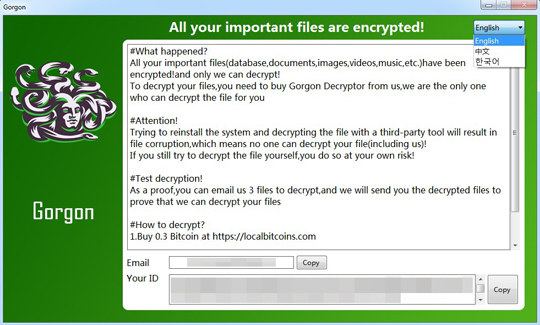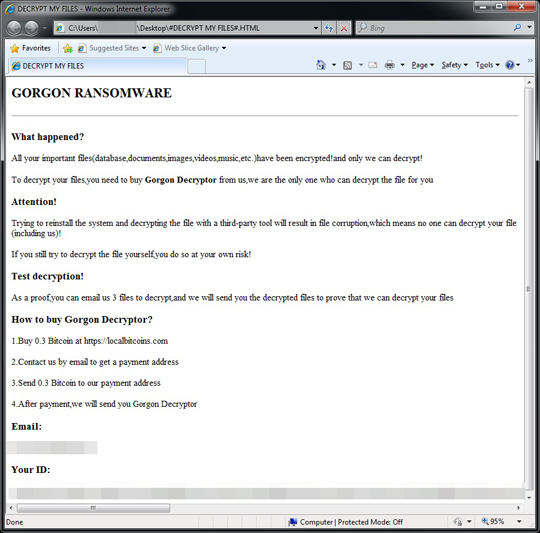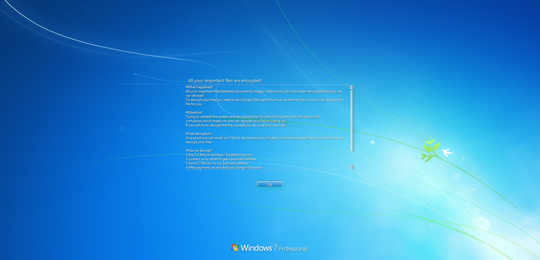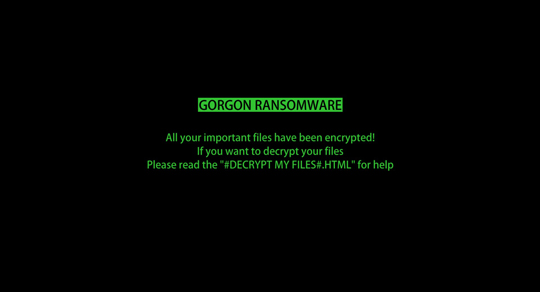Ransom.Win32.GORGON.THOABHAI
MSIL/Filecoder.QU!tr (Fortinet)
Windows


Threat Type: Ransomware
Destructiveness: No
Encrypted: Yes
In the wild: Yes
OVERVIEW
Dropped by other malware, Downloaded from the Internet
This Ransomware arrives on a system as a file dropped by other malware or as a file downloaded unknowingly by users when visiting malicious sites.
It is capable of encrypting files in the affected system.
It encrypts files with specific file extensions. It encrypts files found in specific folders.
TECHNICAL DETAILS
166,912 bytes
EXE
No
28 Jan 2019
Displays graphics/image, Displays message/message boxes, Connects to URLs/IPs, Encrypts files
Arrival Details
This Ransomware arrives on a system as a file dropped by other malware or as a file downloaded unknowingly by users when visiting malicious sites.
Installation
This Ransomware adds the following processes:
- "cmd.exe" /c vssadmin.exe delete shadows /all /quiet
It adds the following mutexes to ensure that only one of its copies runs at any one time:
- check
Other System Modifications
This Ransomware sets the system's desktop wallpaper to the following image:
Other Details
This Ransomware does the following:
- It displays the following window after encrypting files:

- It drops the following file(s) as ransom note:
- {Drive Letter}:\#DECRYPT MY FILES#.HTML
- {Drive Letter}:\#解密我的文件#.HTML
- {Drive Letter}:\#내 파일 복구하기#.HTML
- %Desktop%\#DECRYPT MY FILES#.HTML
- %Desktop%\#解密我的文件#.HTML
- %Desktop%\#내 파일 복구하기#.HTML
- The ransom note contains the following:

- It creates the following registry entries in order to display its ransom note every time the Windows startup:
HKEY_LOCAL_MACHINE\SOFTWARE\Microsoft\
Windows NT\CurrentVersion\Winlogon
LegalNoticeCaption = "All your important
files are encrypted!"HKEY_LOCAL_MACHINE\SOFTWARE\Microsoft\
Windows NT\CurrentVersion\Winlogon
LegalNoticeText = "{Contents are same
as ransom notes}"
- It accessed the shortened URL https://{BLOCKED}er.org/2nZ7w5 that leads to https://i.{BLOCKED}i.net/2019/01/24/5c49d7ec69126.png, an online image hosting site.
- It downloads an image file from an online image hosting site.
- URL: https://i.{BLOCKED}i.net/2019/01/24/5c49d80a2b878.bmp
- Filename: %Desktop%\WALLPAPER.BMP
- It uses speech synthesis and says the following:
- Attention! Your documents, images, databases and other important files have been encrypted!
It is capable of encrypting files in the affected system.
Ransomware Routine
This Ransomware encrypts files with the following extensions:
- .1cd
- .3dm
- .3ds
- .3fr
- .3g2
- .3pr
- .7z
- .7zip
- .aac
- .ab4
- .accdb
- .accde
- .accdr
- .accdt
- .ach
- .acr
- .act
- .adb
- .adp
- .advertisements
- .agdl
- .ai
- .ait
- .al
- .aoi
- .ape
- .apj
- .apk
- .arc
- .arw
- .asf
- .asm
- .asp
- .aspx
- .asx
- .avi
- .awg
- .back
- .backup
- .backupdb
- .bak
- .bat
- .bay
- .bdb
- .bgt
- .bik
- .bpw
- .c
- .c4d
- .cdr
- .cdr3
- .cdr4
- .cdr5
- .cdr6
- .cdrw
- .ce1
- .ce2
- .cer
- .cfg
- .cib
- .class
- .cls
- .cmd
- .conf
- .config
- .contact
- .cpi
- .cpp
- .craw
- .crw
- .cs
- .csh
- .csl
- .css
- .csv
- .db
- .db3
- .dbx
- .db_journal
- .dc2
- .dcs
- .ddoc
- .ddrw
- .dds
- .der
- .des
- .dgc
- .dip
- .djvu
- .dng
- .doc
- .docb
- .docm
- .docx
- .dot
- .dotm
- .dotx
- .drf
- .drw
- .dwg
- .dxb
- .dxf
- .dxg
- .eml
- .eps
- .epub
- .erbsql
- .erf
- .exf
- .ffd
- .fh
- .fhd
- .fla
- .flac
- .flf
- .flp
- .flv
- .frm
- .fxg
- .gif
- .gpg
- .gray
- .grey
- .groups
- .gry
- .hbk
- .hdd
- .hpp
- .html
- .ibd
- .ibz
- .idx
- .iiq
- .incpas
- .jar
- .java
- .jnt
- .jpe
- .jpg
- .js
- .jsp
- .jtp
- .kc2
- .kdbx
- .kdc
- .key
- .kpdx
- .kwm
- .laccdb
- .lay
- .lay6
- .ldf
- .lit
- .log
- .lua
- .m
- .m2ts
- .m3u
- .m4p
- .m4u
- .m4v
- .max
- .mbx
- .md
- .mdb
- .mdc
- .mdf
- .mef
- .mfw
- .mid
- .mkv
- .mlb
- .mml
- .mmw
- .mny
- .mov
- .mp3
- .mp4
- .mpeg
- .mpg
- .mrw
- .msg
- .myd
- .myi
- .ndd
- .ndf
- .nef
- .nk2
- .nop
- .nrw
- .ns2
- .ns3
- .ns4
- .nvram
- .nwb
- .nx2
- .nxl
- .nyf
- .oab
- .obj
- .odb
- .odf
- .odg
- .odm
- .ods
- .odt
- .ogg
- .oil
- .onetoc2
- .orf
- .ost
- .otg
- .oth
- .otp
- .ots
- .ott
- .p12
- .p7b
- .p7c
- .pab
- .pages
- .paq
- .pcd
- .pct
- .pdb
- .pdd
- .pem
- .php
- .pif
- .pl
- .plc
- .plus_muhd
- .png
- .pot
- .potm
- .potx
- .ppam
- .pps
- .ppsm
- .ppsx
- .ppt
- .pptm
- .pptx
- .prf
- .ps
- .ps1
- .psafe3
- .psd
- .pst
- .pwm
- .py
- .qba
- .qbr
- .qbw
- .qbx
- .qby
- .qcow
- .qcow2
- .qed
- .r3d
- .raf
- .rar
- .rat
- .raw
- .rdb
- .rm
- .rtf
- .rvt
- .rw2
- .rwl
- .rwz
- .s3db
- .safe
- .sav
- .save
- .sch
- .sd0
- .sda
- .sdf
- .sldm
- .sldx
- .slk
- .sln
- .snt
- .sql
- .sqlite
- .sqlite3
- .sqlitedb
- .sr2
- .srf
- .srt
- .srw
- .st5
- .st7
- .st8
- .std
- .sti
- .stm
- .stx
- .suo
- .svg
- .swf
- .sxd
- .sxg
- .sxi
- .sxm
- .sxw
- .tex
- .tga
- .tgz
- .thm
- .tif
- .tiff
- .txt
- .uop
- .uot
- .vb
- .vbox
- .vbs
- .vcd
- .vdi
- .vhd
- .vhdx
- .vip
- .vmdk
- .vmsd
- .vmx
- .vmxf
- .vob
- .wab
- .wallet
- .wav
- .wb2
- .wk1
- .wks
- .wma
- .wmv
- .wpd
- .wps
- .x11
- .x3f
- .xis
- .xla
- .xlam
- .xlc
- .xlm
- .xlr
- .xls
- .xlsb
- .xlsm
- .xlsx
- .xlt
- .xltm
- .xltx
- .xlw
- .xml
- .ycbcra
- .yuv
- .zip
It encrypts files found in the following folders:
- {Drive Letter}:\
- %ProgramData%
- %Favorites%
- %User Profile%\Documents
- %User Profile%\Pictures
- %User Profile%\Music
- %AppDataLocal%\Microsoft\Windows\History
- %User Profile%\Downloads
- %User Profile%\Videos
- %Desktop%
(Note: %ProgramData% is a version of the Program Files folder where any user on a multi-user computer can make changes to programs. This contains application data for all users. This is usually C:\ProgramData in Windows Vista, 7, and 8.. %Favorites% is the current user's Favorites folder, which is usually C:\Documents and Settings\{user name}\Favorites on Windows 2000, XP, and Server 2003, or C:\Users\{user name}\Favorites on Windows Vista, 7, and 8.. %User Profile% is the current user's profile folder, which is usually C:\Documents and Settings\{user name} on Windows 2000, XP, and Server 2003, or C:\Users\{user name} on Windows Vista, 7, and 8.. %AppDataLocal% is the Local Application Data folder, which is usually C:\Documents and Settings\{user name}\Local Settings\Application Data on Windows 2000, XP, and Server 2003, or C:\Users\{user name}\AppData\Local on Windows Vista, 7, and 8.. %Desktop% is the current user's desktop, which is usually C:\Documents and Settings\{User Name}\Desktop on Windows 2000, XP, and Server 2003, or C:\Users\{user name}\Desktop on Windows Vista, 7, and 8.)
It appends the following extension to the file name of the encrypted files:
- .[buy-decryptor@{BLOCKED}m.me]
SOLUTION
9.850
14.778.02
28 Jan 2019
14.779.00
29 Jan 2019
Step 1
Before doing any scans, Windows 7, Windows 8, Windows 8.1, and Windows 10 users must disable System Restore to allow full scanning of their computers.
Step 2
Note that not all files, folders, and registry keys and entries are installed on your computer during this malware's/spyware's/grayware's execution. This may be due to incomplete installation or other operating system conditions. If you do not find the same files/folders/registry information, please proceed to the next step.
Step 3
Identify and terminate files detected as Ransom.Win32.GORGON.THOABHAI
- Windows Task Manager may not display all running processes. In this case, please use a third-party process viewer, preferably Process Explorer, to terminate the malware/grayware/spyware file. You may download the said tool here.
- If the detected file is displayed in either Windows Task Manager or Process Explorer but you cannot delete it, restart your computer in safe mode. To do this, refer to this link for the complete steps.
- If the detected file is not displayed in either Windows Task Manager or Process Explorer, continue doing the next steps.
Step 4
Delete this registry value
Important: Editing the Windows Registry incorrectly can lead to irreversible system malfunction. Please do this step only if you know how or you can ask assistance from your system administrator. Else, check this Microsoft article first before modifying your computer's registry.
- In HKEY_LOCAL_MACHINE\SOFTWARE\Microsoft\Windows NT\CurrentVersion\Winlogon
- LegalNoticeCaption = "All your important files are encrypted!"
- LegalNoticeCaption = "All your important files are encrypted!"
- In HKEY_LOCAL_MACHINE\SOFTWARE\Microsoft\Windows NT\CurrentVersion\Winlogon
- LegalNoticeText = "{Contents are same as ransom notes}"
- LegalNoticeText = "{Contents are same as ransom notes}"
Step 5
Search and delete this file
- {Drive Letter}:\#DECRYPT MY FILES#.HTML
- {Drive Letter}:\#解密我的文件#.HTML
- {Drive Letter}:\#내 파일 복구하기#.HTML
- %Desktop%\#DECRYPT MY FILES#.HTML
- %Desktop%\#解密我的文件#.HTML
- %Desktop%\#내 파일 복구하기#.HTML
- %Desktop%\WALLPAPER.BMP
Step 6
Scan your computer with your Trend Micro product to delete files detected as Ransom.Win32.GORGON.THOABHAI. If the detected files have already been cleaned, deleted, or quarantined by your Trend Micro product, no further step is required. You may opt to simply delete the quarantined files. Please check the following Trend Micro Support pages for more information:
Step 7
Restore encrypted files from backup.
Did this description help? Tell us how we did.


